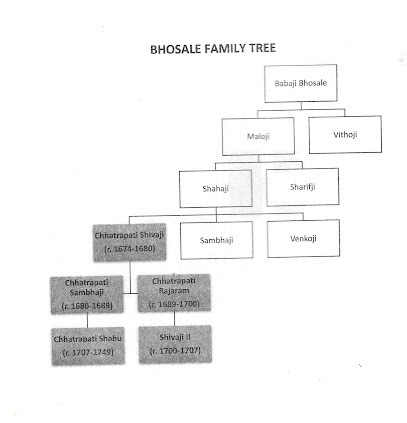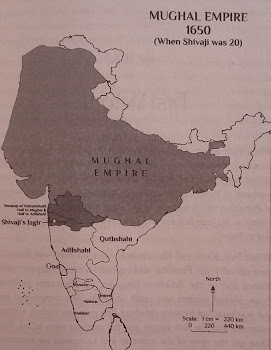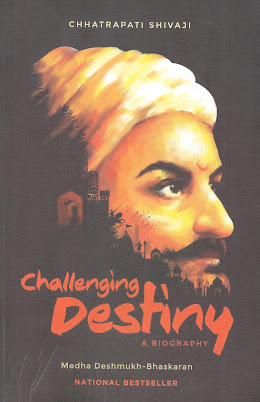I guess it was destiny that the 150th post of Life Etc Etc had to be about Shri Chhatrapati Shivaji Maharaj. Shivaji rose like a phoenix from humble beginnings in the 17th century and laid the foundation for the Maratha empire which changed the course of history. The history I studied at school restricted his life and achievements to a single chapter and quite erroneously credited the British Rule with the decline of the Mughal empire. I found out later on that it was in fact the Marathas under the able leadership of Shivaji who hastened the Mughal empire's downfall. They were the preeminent power whom the British had to checkmate in order to wrest control of the Indian subcontinent. Despite such monumental achievements my history syllabi had very little information about Shivaji. It was therefore a no-brainer for me to pick up this book and discover for myself why the history of India would never be complete without the mention of Shivaji.
In order to understand any historical character you need to delve into the times they lived, understand the events which molded them and the personalities who inspired them. Medha Deshmukh-Bhaskaran starts her story 600 years before Shivaji was born when Mahmud of Ghazni defeated King Jayapala (of the Hindushahi Dynasty) to advance into the Indian sub-continent. That victory opened the doors for many foreign invaders, some who just wanted to plunder the country and some with ambitions of installing a vast empire which couldn't be rivalled anywhere else in the world. Along the way she highlights:
- The destruction of the Yadava empire (their capital Devagiri was later renamed to Daulatabad) at the hands of Alauddin Khilji in the 13th century
- The fall of the Vijayanagara empire in 1565 and the rise of the Nizamshahi, Adilshahi and Qutbshahi kingdoms in the Deccan
- The bloody battle of Haldi Ghati in 1576 between Emperor Akbar and ruler of Mewar, Rana Pratap. The Mughal forces couldn't depose Rana Pratap but were able to inch towards Deccan once the great warrior was no more
- Shivaji's mother Jija Bai who traces her roots to the Yadavas of Devagiri (which has since become a part of Nizamshahi) and instills in her son the dream of Swaraj
- The enormous services rendered by Shahaji Bhosle (Shivaji's father) to the Nizamshahi empire and how all those efforts came to a nought when the kingdom was dissolved by a joint offensive from the Mughal and Adilshahi forces
 |
| Shivaji's Family Tree |
Once this context has been laid out, it becomes fairly straightforward to understand Shivaji's lofty ambitions. The jagirs his father earned and those of his mother's ancestors were all under foreign rule. All he was left with as a kid is the warn torn province of Pune which was deemed too insignificant by the Mughals and the other kingdoms in Deccan. Under the guidance of Dadaji Kondadeo, Shahaji's advisor, Shivaji and his mother nurse their province back to peace and prosperity. Shivaji's tryst with autonomy begins here and Medha Desmukh-Bhaskaran gives us an insight into all of the tactical moves that Shivaji makes in order to not only restore the glory of yesteryears but also to ensure the happiness and safety of his people who have come to respect him as a leader and look up to him as a savior.
Shivaji's path towards immortality is replete with danger and the book details several interesting anecdotes from his life such as:
- Shivaji's famous duel with Afzal Khan, the ruthless Adilshahi military commander
- His daring raid at night on Shaista Khan who was appointed by Aurangzeb to quell his progress in the Deccan
- His fortuitous escape from Aurangzeb's house arrest in the nick of time. History doesn't record how Shivaji got away but the multiple theories that are presented in the book are quite fascinating
- How Shivaji's aggression towards Surat (which was a Mughal empire stronghold) ultimately led to Bombay taking over as the leading port of business in western India?
- Shivaji's foray into southern India and the intense spiritual connection he experienced at the Srisailam temple
 | ||
|
I am not a huge fan of historical biographies which sacrifice factual accuracy for invoking a sentimental reaction within the readers. I have to commend Medha Deshmukh-Bhaskaran once again here for her extensive research which collates the works of not only noted historians but also of those luminaries who had first hand accounts of the great man. Furthermore this book refers to several letters and documents from that era which give readers an idea of how other prominent figures of that time period perceived Shivaji.
It's not an overstatement to regard Shivaji as the architect of modern India. Shivaji treated people of all religions equally and under his command women and children of the conquered lands could suffer no harm. He was also a visionary when dealing with the European settlers. He kept a close eye on their transactions and ensured that nothing strategic was ever conceded to them.
If the history of India interests you then there's one person whose biography you absolutely cannot miss. That person is Chhatrapati Shivaji Maharaj, his courage, determination and sense of justice are inspirational to one and all. Thank you Medha Deshmukh-Bhaskaran for taking us along with you into the realms of history and enlightening us with several facts from the last thousand years.
Recommended: Must Read
Until next Time,
Your Friendly Historian.

Comments
Post a Comment